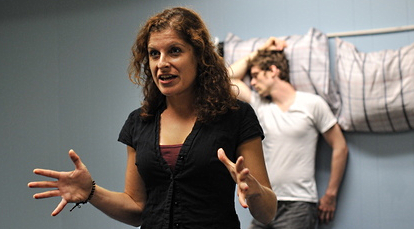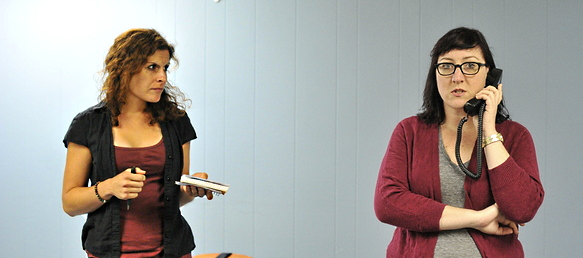
“We should revive and develop the ancient spirit of righteous indignation,” the speaker argues. “The citizen who through indifference or cowardice is as reprehensible as the wrongdoer.”
The speaker is Roger Alton Pfaff, Los Angeles County Judge, in a speech titled “The Strength of Sacrifice.” The speech was presented on Memorial Day, 1960, but it is easy to imagine Pfaff’s words coming from the lips or the pen of Edward Snowden or Julian Assange, and it is equally easy to imagine them coming from Tell-Tale’s Charlie, the play’s most vocal proponent of storytelling as a means of noble sacrifice. A journalist who argues that “you’re never close enough to the story until you’re way too close,” Charlie’s journey throughout the play provides an almost disturbing reality to an otherwise eerie but dreamlike narrative. She reminds us that the story we are witnessing is not mere fantasy—that the sacrifice made by those who give and receive tales is very real, very relevant.
Although Tell-Tale exists in the realm of the surreal, it operates within several very real contexts—one of which is Charlie’s journalistic experience. As the characters move through these various spaces, the text remains focused on a single, essential question: Is there, as Pfaff argues, strength in sacrifice, or does sacrifice weaken us?
At first, Charlie’s background as a journalist seems almost out-of-place in the world of the play. It is first brought up when Logan sharply reminds her that “Not everything is worth an investigation,” in response to her prying into his initial vision of Hannah. In the ensuing conversation, we discover that Charlie has written an exposé on the criminal practices of a powerful law firm after being approached by a young paralegal, a whistle-blower named Eric Myers, who later disappeared. She is torn between a sense of guilt for the role she played in helping Eric make “powerful enemies” and her journalistic code, which tells her that it was her responsibility to publish the story Eric gave her. “It’s my fucking civic duty!” she reminds herself, echoing Pfaff. But she is uncertain, and her uncertainty remains palpable throughout the play.
It is inevitable that audiences will immediately conjure up timely thoughts of Edward Snowden and his contact at The Guardian, Glen Greenwald, upon being confronted with this aspect of Tell-Tale’s story. Charlie’s words also echo those of journalist John Pilger in 2011, who refers to journalists as “those of us meant to keep the record straight,” and their task as that of “[serving] the public without fear or favour.” Like Charlie, Pilger seems to be reassuring himself that he is on the right side of history. But the argument becomes less and less solvent the deeper one explores it, just as Charlie’s righteousness becomes increasingly clouded throughout the play. Who is served by the exposure of the stories we tell, and who is wounded? When we take on the responsibility of telling the story of another, what part of ourselves must we give up?
The ambivalence of journalists attempting to understand their civic duty in an ever-changing world has deeper connections to the questions at the heart of the play. Charlie’s struggle is mirrored and magnified in Hannah’s—while Charlie is grappling philosophically and morally with the question of taking on the stories of others, Hannah is forced quite literally to do so. It is through Hannah that we see laid bare the consequences that Charlie fears: as Hannah is absorbed into the lives of her donees, she loses herself. Charlie, too, has already begun to lose herself in Eric’s story—when we first meet her, she is already afraid that she is being watched, sure that at any moment she could disappear, as Eric did. When applied to Hannah’s experience, Charlie’s reference to becoming “too close” to another’s story takes on a new weight. Hannah is close enough to heal, but too close to survive.
Both Hannah, in a literal sense, and Charlie, in a more abstract sense, are bearing the weight of stories, participating in acts of self-sacrifice in order to do so. Toward the end of the play, Logan asserts that “no one” can “give and give” as Hannah does—“no one is that strong”—but Charlie seems to remain uncertain. Her final act in the play is to question whether or not she will continue to allow her journalistic instincts to guide her actions—“the body of a story takes hold in my mind,” she says, but she is undecided as to what will happen to that story. The play provokes the audience to consider this question for itself: what is Charlie’s duty here, to herself, to her husband, and to her society? To what degree is there, in fact, strength in sacrifice, in telling tales?


